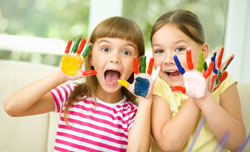
This guide provides help and advice on how to enter and win kids creative competitions. These types of competitions come in all shapes and sizes. Promoters tend to offer highly creative idea-based competitions for children – most require some level of adult supervision.
Before you get carried away with the fun and excitement– read the terms and conditions. Some promoters might want to use your entry (even if it’s not the winner) for their photo stock – particularly if it features your child using their product. They become the owners of your image – and might chose to use it, royalty-free, in any promotions and that could cause distress at a later stage. As a parent, it is your decision to let this happen. If you don’t want this to happen, check in the terms and conditions to see exactly what they will do with your hard work.
Babies/Toddlers
Photography is the main type of competition for this age group. Take time to read through the photography guide section because the judges will have to sieve through a vast amount of entries and a quality picture might give you the edge.
Blurriness is common with these types of photos because babies and toddlers are active – so take lots of shots so that you have a lot to choose from! If you want a smiley face – putting something weird on your head to produce a laugh will also minimise a red-eye effect, as it will prevent your little one looking directly into the camera.
Promoters have a lot of shots featured in domestic environments, so you might want to tidy up before taking pictures – your underwear hanging on the radiator may be true to life, but not necessarily something you’d like to advertise in front of the general public!
Dress-up and keep it clean – a snotty nose and a chocolate covered face with a bib that has seen better days may seem adorable to you, but your photo has the potential to be judged by a faceless crowd of parents not your family members!
If other children feature in your photo (maybe the photo was taken in a colourful soft play centre or at a social/public event) ensure you get permission from the other parents to use the photo.
Primary School Children
It is common for this age group to be asked to create something – a piece of art or a design for a poster or product. Remember, children like to rush into things, so choose a good time for your child to tell them about the competition – when they have enough time and resources at their disposal to get started straight away.
Discussing ideas with them can be a double-edged sword. Our tip is not to discuss the ideas, but leave it up to the kids! You can to get a few avenues for them by devising an ‘INSPIRATION STATION’ (shoebox) full of examples that they can look through, previous winning entries and places where they can seek more information themselves works well for over 7’s.
What you DO need to drill into them are CLEAR SIMPLE INSTRUCTIONS relayed to the terms and conditions. That way, you are giving them as much freedom as they need – and make sure you are available for questions. Resist doing it for them – the child will get no enjoyment from that, and high parent input is transparent to promoters. Think how proud your child will feel to know they did it all by themselves! Trust them – give them the power to choose with minimal direction from ‘boring grown-ups’!
A lot of these competitions allow the child to win something for their school – if this is the case, you’ll most likely have to contact the school. TO AVOID DISAPPOINTMENT: Ensure you read the terms and conditions and make sure everything is in place with the correct school department before you start.
Secondary School Children
Less parental supervision is required here, but the emphasis is still on reading the terms and conditions, and having everything they need at their disposal. Teenagers benefit from having previous winning examples and info at their fingertips. They are more inclined to research independently, but anything you can do to reduce the time spent on this, will not be in vain.
Teenagers are used to creativity within a social media context, they will probably have a much better idea about what will win than you will! Even so, if the competition is linked to winning resources for your school, you might have to fill out a couple of forms to be sent with the entry.
Deadline dates. Need we say more? Teenagers have so much homework to do, but they will benefit from suggestions about time management – maybe go through their schedule with them to help them identify spare time.
Most of all – have fun! Childhood, for some, is the most creative period of their lives – they will love you to be involved with their schemes and you’ll have plenty of fond memories (and hopefully prizes too!) to look back on.
Good Luck!

